Kurt Ballou (Converge) talks gear and guitars
Guitarist Extra: Kurt Ballou (Converge) guitar interview
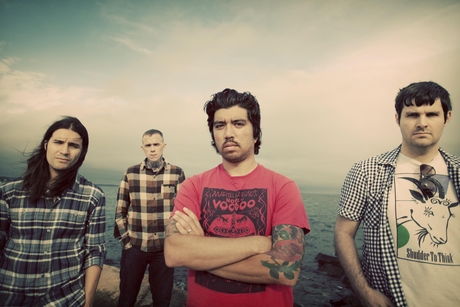
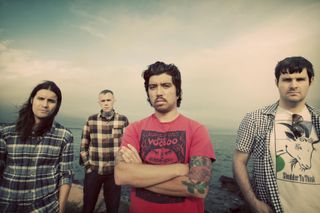
© Matt Miller
Massachusetts metalcore pioneers Converge have been tearing up stages the world over for two decades now, bringing a rare kind of intensity both live and on record.
At the heart of this is guitarist Kurt Ballou, a creative and technically gifted player whose unique approach to what metal guitar should sound like gives the band a sound of raw, messy ferocity.
Guitarist spoke to Kurt just before their superb latest album, Axe To Fall was released, and we talked tone, amps, a passionate defence of EMG pickups and making albums like French fries. Read it all here, only on Guitarist.co.uk.
Let's start at the beginning; what made you want to learn to play the guitar?
Well originally I wanted to play bass, and a friend of me also wanted to play bass, and we wanted to start a band together. So we made this pact that whoever saved up enough money to buy a bass first got to be the bass player and the other guy had to play guitar!
So that's how I got into the guitar. I mean, I was into music before that, I played saxophone and clarinet earlier in life. My Dad sorta played guitar, so there was always a guitar laying around the house that I could pick up and play from time to time, but I didn't really like playing it until I got into rock music when I was around 16 or so and I started messing around with my dad's guitar.
Get the MusicRadar Newsletter
Want all the hottest music and gear news, reviews, deals, features and more, direct to your inbox? Sign up here.
You mentioned playing sax and clarinet. Do you believe that this musical background has had an impact on the complexity and unusual nature of Converge's music?
Yeah definitely, I have some musical training and probably a lot of people who play rock music haven't. I think there's a lot of plagiarism that goes on in music, and I've just been plagiarising from sources people don't really know about - my jazz and classical roots.
I think that music has accents; the way you learn to speak your language is reflected in the accent you develop. While that may change over time, it still forms the foundation of how you communicate and forms your vocabulary.
I started playing music when I was about 10, so my early musical vocabulary was developed through those wind instruments and playing in a school band. So my early interpretation of punk and hardcore was filtered through my musical understanding of classical and jazz.

You were one of the founders of that metalcore genre, what was it like in those early days, when it seemed like mainstream music was abandoning guitar music and technical proficiency…
I wouldn't say we were the start of it, I would say we were the first generation to be raised on thrash metal and we were part of this group who liked Metallica, but also discovered punk and hardcore through skateboarding, and in turn these local bands such as Slapshot, Terminally Ill and DYS and I think we had some of the same intensity and motivation.
But then also, we were the first generation to grow up with MTV and so we had that as well. So on a Friday or Saturday night we might go and see Metallica or the Cro-Mags or Agnostic Front, or maybe some of the Bay Area thrash bands that used to come through. But then also we might go and watch local hardcore bands.
But I think the first few years of that, it wasn't really done very effectively and it took quite a few years for it to flush itself out.

Moving on to the new album, you've said that You Fail Me, Jane Doe and No Heroes represents a trilogy, how do you feel Axe To Fall moves the band in a different direction?
I think it's more of an adult approach. That's because we set goals when we make a Converge record not only to make something that we find compelling but also something that we'd listen to if we weren't in the band.
So in that way it still falls in line with those previous albums. But this is more of a forward-looking musical journey - I think we thought less about the representation of these songs live than we did about creating an atmosphere.
Certainly with Axe To Fall there's more progressive and innovative direction, rather than just pure aggression.
Was there anything particularly influencing the band when you were making it?
I think we take a lot of influences and then take them out of context. I know that I tailor my guitar playing a lot to the people that I'm playing with, in a broad sense.
But certainly, our drummer has really got into progressive rock over the last few years I think that the guitar and the writing is moving in the direction of his playing.
You produced this album as well as playing on it, does that affect the way you look at things when it comes to doing your parts?
It makes you come to terms with your abilities or lack thereof, more so than working with someone else, because there's no one to put the blame on if it doesn't turn out right. But it also ensures that you're in-touch with your entire creative vision. It makes you feel more connected to the band as a whole if you're taking control of every action.
Converge are incredibly intense band to watch live, how to you recreate that in the studio?
Well there's a lot of things we do live, there's that visual element and the excitement - that immediate ear-to-ear thing - whereas on the record you have to do other things, there's a lot of selective layering of the instruments and what happens to the amps when you push them really hard.
There's things that happen when you're at a hardcore show and your in this big circle of bodies the drums are right by your head and guitars are slashing past your ears - you're not really getting a realistic interpretation of the music your ears are hearing cause of all that other stuff.
But I really don't mind if some of the nuance of it gets lost live because we want to recreate that chaos of being at a live show.
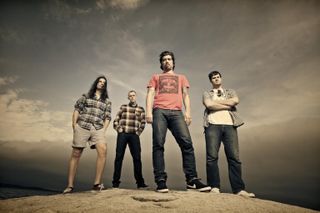
© Matt Miller
You've got a lot of guest appearances from your colleagues in the hardcore fraternity, such as the guys from Cave In and Entombed, what did they bring to the record?
Every record we do, we always try not to repeat ourselves, so we try to take a different approach to every song we write, not just to create a nice mixture, but to make sure the song is different to the other songs we've got.
So bringing in a handful of people that we have, where we have a mutual musical respect and understanding, that inspired us to see different things in ourselves. And like how I was saying earlier that I tailor my guitar playing to suit someone else's style - all of us were tailoring our songwriting skills to suit the guest appearance.
Someone would come in and lay down a part on a song and that would cause us to rethink another element of that song based on their contribution: sometimes it was just as simple as Hey, let's get an extra voice on this part, but then in other cases it would change the song and would cause us to pull something out of ourselves that we wouldn't normally come across.
There's a catalyst there that the four of us don't possess, but they could really pull out of us.
There's a real sense of extremes on this album, Reap What You Sow and the title track are incredibly intense and heavy, yet there are some tracks, Worms Will Feast/Rats Will Feed for example that are almost quiet! Is this dynamic contrast something you're going to explore more in the future?
Definitely, in terms of a studio record, we want it to be as diverse album as it can without the divergence leading to a lack of cohesion. In this day and age where everyone's just listening to single songs on their iPods, we wanted to make sure that if we're going to put out a record that's 30 or 40 minutes long it should be something that people should want to hear all the way through.
It's policed enough that it's not going to sound like a mixtape, but it's diverse enough to hold your attention for 40 minutes.
I mean, if you have 40 minutes of grindcore it doesn't really work - without that contrast you can just glaze over in the way that you can get bored of your job or bored of your friends. You might love French fries, but if all you ate were French fries you'd get sick of French fries pretty fast.
But if you get like curry one day and burritos the next all of a sudden you want French fries again - so we try to make a record that's like a three-course meal [laughs].
This is the first Converge album to feature proper guitar solos, was that something you wanted to do, or was it more as a result of the input of your guest players?
Yeah, I actually only played like one solo, I don't know if you can even call it a solo, I played the lead stuff in the song Cutter, all the rest of is guest appearances. Solos aren't really something that I developed in my repertoire as a guitarist, I've never really been into the guitar, I've always been more into songwriting and using the guitar as a vehicle for writing songs.
So it's not really my thing, although we've been playing the song Reap What You Sow live, so I've been mimicking (ex Hatebreed guitarist) Sean Martin's guitar solo. So I mean I can play that stuff, I've just never been a freewheeling, jamming guitarist - I'm not so good at doing stuff off the cuff well.
So much of your playing is fast and intricate, and heavily distorted, yet it sounds so clear, and there's great note definition there, is that down to the way you record it, technique or the gear?
It's both, I mean, the sound definitely starts off with the fingers. I think that guitarists' fingers and also their ears and how they interpret sound and therefore how they set the amp up, plays a big part in the overall tone, and then of also there's the engineer - in this case being me.
But I think generally in heavy music, people make the mistake of not using up the whole range, and maybe using a BBE Sonic Maximizer that takes out all of the midrange. I mean, when you're playing on your own in your bedroom that sounds awesome, it sounds really thick and full. But in the context of a band, all the high-end disappears in the cymbals and all the sub-bass gets swallowed up by the bass drum and the bass guitar.
From an early age, my favourite guitar sound was always a slower guitar sound - that big Marshall sound as opposed to a Pantera sound, which is really scooped. So I've always gone for a base sound that really helps the note definition, you need all you can to help you cut through.
I also go for a Fender-style guitar - not actual Fenders, but with the bolt-on neck, a lot of maple and a brighter sound. I want my guitar sound to be sort of like a blend of [Chicago noise rockers] Shellac, that really twangy sound, with a Slayer sound - I know that's not possible but I've always really appreciated the definition you get with that twangy sound.
What about tunings, heavy gauge strings and the like, it's a popular part of modern metal yet not everyone likes it, what do you think?
I use D'Adario Heavy strings, which I believe are 12-54, but it's got an unwound G string so you can still bend really easily, It's also a case of the thicker the string the tone you have, the more output you have and also, especially with dropped tunings, the sustain you get when you hit the strings. Also I use 25.5-inch scale electric guitars, which helps keep the intonation in, within reason.
I love that guitar sound at the start of Worms Will Feast/Rats Will Feed, it's really unique, what were you using there?
The bulk of that sound is from a Bad Cat Panther and a Bad Cat Black Cat, which were set to sound kinda similar, and I think that, well we didn't really try to get a rotary speaker effect, but it almost sounds like it - we were using a stereo delay. But mainly it's the two Bad Cats and we doubled up the guitars on the accents, for the heavier sections of it.
You use a lot of boutique gear, Bad Cat amps, THD amps, Providence pedals - do you consider yourself a bit of a gear connoisseur?
Yeah I guess so, I'm a little snobby about that stuff. But then I also have some really cheap stuff, I mean the amp the amp I used for most of the album cost $200.
It was a Guild Thunderbass. In fact most of the album sound was that, through an Emperor cab and also a Bad Cat Lynx going through a Marshall 1 x 12 and the THD. The Thunderbass was really cool, I used that on pretty much every track.
But yeah, I appreciate good gear, but I've really been trying to sell of the stuff I don't use, I actually sold the THD recently. It's a really great amp, but it's just not something I use. It's kind of like a warm, spongy sound that doesn't really suit we do. I think it's an awesome amp, but it doesn't really suit what I do very often, so I sold it.
But I still have three Bad Cats, I think I tend to prefer boutique over vintage stuff because it's a bit more reliable. I'm not really buying stuff for the sake of it, but I do appreciate it all! I mean it's always good to have good tools.
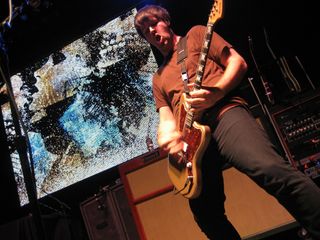
© Apeshit
Did you take any new guitars, amps and effects into the studio?
I recorded most of the album with my First Act Sheena guitar, I used that on the last record as well. Oh, for this album I did use Emperor cabinets, which was new, and I don't think there was any new effects.
Actually, y'know what, there was one new pedal with the Foxrox Octron, which is a really cool octave fuzz pedal. It lets you control the level of octave down, octave up, and direct - its sort've become a go-to lead guitar sound for me now.
You seem to like using guitars that are a bit different - your Sheena and the Warmoth Jazzmaster for example - that aren't necessarily stock, is that intentional or do regular guitars just not do the job?
I built the Jazzmaster before I was offered the First Act endorsement and it was actually the closest I could get to what my Sheena is before I realised I was going to be able to get the Sheena.
For me, it's just kinda cool to have guitars that look different from everything else out there. And also, I'm a pretty big guy, so it's good to have a comfortable guitar, not just the size and the weight, but also the fingerboard; I have really big hands so I use a 1.75-inch fingerboard and I also have a certain type of fretwire that I like, Dunlop 6130.
We tend to use a lot of different tunings and the order we choose the songs in have a lot to do with what tunings they're in, so I'll need three or four guitars at a show, but I don't want to be changing amp settings from song to song and I also don't want to have a guitar that feels radically different from song to song.
So despite the fact that my guitars look different I have them all set up with the same woods, the same pickups and the same fretwire, so I can go from song to song in all these different tunings.
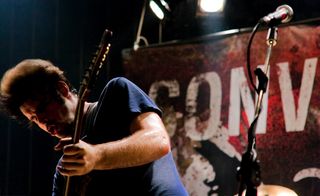
© Charlie Cravero
You're a big fan of EMG pickups, what do you like about them?
Well, y'know I think they get a bad rep, because a lot of ESP guitars come stock with EMGs so you get a lot of metal guys using them. But really when you think about the basic principle of the EMG, it's actually more like a vintage pickup in that there's not a lot of winding on them.
They usually say that with the fewer windings the better the tone, the better the frequency response. But if you want to make a pickup really hot you end up doing more windings, which reduces the band width of the frequency response - you're getting less of the lows and less of the highs, but you do get a more focussed midrange.
But with EMGs they're really low noise, so you don't get as much hum, and then you have the built-in preamp, which allows the signal to be a little more than most high-output humbuckers. So in my case it allows me to use vintage amps or amps that aren't necessarily designed for high-gain applications but drive them to a high gain sound because of the pickups.
I find that full-band pickups don't sound stereotypically metal to me, they sound like a quality articulate high-output pickup.
I bought this Ibanez guitar when I was 17 years old and it had these EMGs in it. When I eventually sold that guitar I kept the pickups, put the pickups from the guitar I was buying next into that, and I still have those pickups today - they're still going strong and they've treated me really well over the years.
Also another thing about EMGs, because they're sealed units you don't get problems with corrosion that a lot of other pickups suffer from.
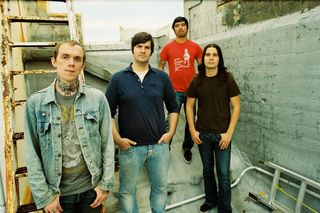
They're not very well known over here, but it seems like a lot of alternative US bands such as your friends Mastodon and High On Fire are using them, what do you like about them?
Even over here, with the American-made series they're not very widely available, they pretty much build to order. But yeah, the people there are really sweet to work with, they love to do what they do and they're skilled craftsmen. So if you're someone who knows what they want, like I am, they'll keep working on it until it's right.
Even the stock guitars, I've got a couple of the Chinese-made ones that are replicas of the American ones, even those are surprisingly really good, they're much better than other guitars I've played from First Act's competitors.
If you compare one of the budget Gibsons with one of the budget First Acts, I think there's no contest.
You've been using the Bad Cat amps for a while now, they aren't known for being full-on metal monsters, how do you get it sounding so nasty? Are there a few pedals thrown in there?
Sometimes I use this pedal called the Stampede by a Japanese company called Providence, but most of the time I use a Boss EQ pedal with a little bit of the mids turned up and the level cranked. But for recording I generally I don't usually use that at all.
The Lynx that I play has plenty of gain, even with no pedal I'd never turn the gain up above like, five. They also have a model called the Hot Cat that I used to have and liked.
The latest one I got that I really liked the sound of was the Panther. It's the 6V6 version of the Black Cat and the Lynx, and its got a channel that's like the Lynx, but it's lower gained. The Lynx is more of a midrange monster, but with a really articulate, throaty low-end.
The Panther has a channel that's kind of like the Lynx, but it's more of a rock channel than a metal channel, and it also has a channel that's like the Black Cat but it's 6V6 instead of EL84 - it's significantly richer sounding, but not quite as chimey, it sounds less like a Vox and more like a Fender.
Converge's latest album, Axe To Fall is out now, and the band play the The Underworld, London on 29 July 2010, and Sonisphere, Knebworth on 1 August. For more details visit the Converge official website.

“Definitely one of the most unique pieces to come through our showroom”: It was left in a nightclub in '74, then “hidden in a closet for decades”, now Mike Bloomfield’s custom-painted 1966 Telecaster is up for sale

“There is still no power but we have survived”: Joe Bonamassa returns to Nerdville West, after LA wildfires threaten home and vintage gear collection
Most Popular







